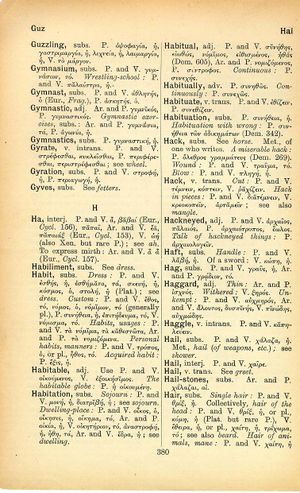gymnasium
Δύο γὰρ, ἐπιστήμη τε καὶ δόξα, ὧν τὸ μὲν ἐπίστασθαι ποιέει, τὸ δὲ ἀγνοεῖν → Two different things are science and belief: the one brings knowledge, the other ignorance
English > Greek (Woodhouse)
subs.
P. and V. γυμνάσιον, τό. Wrestling-school: P. and V. παλαίστρα, ἡ.
Latin > English (Lewis & Short)
gymnăsĭum: ii, n., =γυμνάσιον,
I a public school among the Greeks for gymnastic exercises, a gymnasium.
I Lit., Plaut. Am. 4, 1, 3; id. Bacch. 3, 3, 21; id. Ep. 2, 2, 13; Cic. Tusc. 2, 15, 151; id. Rep. 3, 32; 4, 4: virgineum (in Sparta), Prop. 3, 14, 2; Ov. H. 16, 151; Cels. 5, 11; 15; Plin. Ep. 10, 40, 2; Quint. 2, 8, 3 al.—Comically: gymnasium flagri, qs. school for the scourge, whipping-post, a term of reproach applied to one who is often flogged, Plaut. As. 2, 2, 31; cf.: totus doleo, ita me iste habuit senex gymnasium, i. e. he has belabored me so, id. Aul. 3, 1, 5.—
II Transf., a public school among the Greeks, a highschool, college: omnia gymnasia atque omnes philosophorum scholae, Cic. de Or. 1, 13, 56; Liv. 29, 19, 12; Plin. Ep. 1, 22, 6; Juv. 3, 115: quae vix in gymnasiis et in otio Stoici probant, Cic. Par. prooem. 1.— Transf., of a college-building on Cicero's Tusculan estate: cum ambulandi causa in Lyceum venissemus (id enim superiori gymnasio nomen est), etc., Cic. Div. 1, 5, 8; cf. id. Tusc. 2, 3, 9.
Latin > French (Gaffiot 2016)
(1) gymnăsĭum,¹¹ ĭī, n. (γυμνάσιον),
1 lieu public chez les Grecs destiné aux exercices du corps, gymnase : Cic. Tusc. 4, 70, etc. || habere aliquem gymnasium Pl. Aul. 410, prendre qqn pour un gymnase, s’escrimer sur qqn, le battre
2 école philosophique [les réunions philos. se faisant sous les portiques ou dans les gymnases] : Cic. de Or. 1, 56 ; Par. 1 || gymnase [comme lieu de réunion pour causeries, etc.] : Plin. Min. Ep. 1, 22, 6 [Cicéron en avait un dans sa maison de Tusculum, Cic. Div. 1, 8 ].

